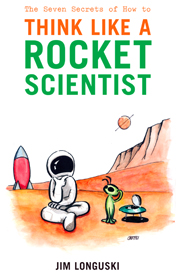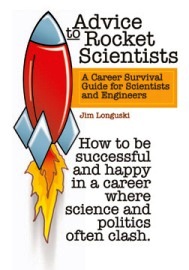+ The Seven Secrets of How to Think Like a Rocket Scientist
 This book translates thinking like a rocket scientist into every day thinking so it can be used by anyone. It is short and snappy and written by a rocket scientist. The book illustrates the methods (the 7 secrets) with anecdotes, quotations and biographical sketches of famous scientists, personal stories and insights, and occasionally some space history. The author reveals that rocket science is just common sense applied to the extraordinarily uncommon environment of outer space and that rocket scientists are people, too. It is intended for armchair scientists, and for those interested in popular psychology, space history, and science fiction films.
This book translates thinking like a rocket scientist into every day thinking so it can be used by anyone. It is short and snappy and written by a rocket scientist. The book illustrates the methods (the 7 secrets) with anecdotes, quotations and biographical sketches of famous scientists, personal stories and insights, and occasionally some space history. The author reveals that rocket science is just common sense applied to the extraordinarily uncommon environment of outer space and that rocket scientists are people, too. It is intended for armchair scientists, and for those interested in popular psychology, space history, and science fiction films.
The book was published by Springer, New York, NY in 2007. You can see the table of contents here, read reviews for the book and download a sample chapter for reading. See Amazon and Barnes & Noble in addition to Springer to own this book.
Think Like a Rocket Scientist! Purdue Engineering Impact Magazine.
Rocket Science For Dummies. www.spacedaily.com
Prof. Jim Longuski with Dr. Masa Okutsu at the book signing day in the local Barnes & Noble store.
+ Advice to Rocket Scientists: A Career Survival Guide for Scientists and Engineers
 As a long-time NASA engineer and astronautics professor, Jim Longuski watched first hand as gifted rocket scientists and students learned their way around the lab only to lose their way in the board room.
As a long-time NASA engineer and astronautics professor, Jim Longuski watched first hand as gifted rocket scientists and students learned their way around the lab only to lose their way in the board room.
Longuski decided to write what he calls a survival guide for rocket scientists. In this small book, Longuski uses humor and personal anecdotes to give engineers and scientists an edge in an industry in which one gets ahead as much on interpersonal-skills as on technical merits.
If you are a rocket scientist, or want to become a rocket scientist, or know and care about a rocket scientist then this book is for you, Longuski explains in his introduction.
The book is especially valuable for those who are attempting career transitions, whether from student to aerospace worker or from aerospace worker to university researcher or teacher. Longuski explains how the work place is different from the academic environment. He gives readers real-world advice about how to find jobs, negotiate offers, and keep bosses happy. He implores students to have confidence and speak directly with potential employers rather than simply mailing in resumes and hoping for the best.
He tells readers how to produce technical reports and give presentations that will keep colleagues interested. In a chapter called What if the Rocket Doesn’t Work? he helps engineers cope with failure. Longuski presents a reality that too many scientists and engineers ignore: Getting ahead and staying happy involves mastering inter-office politics.
The book was published by American Institute of Aeronautics and Astronautics, Inc.(AIAA), Restin, Virginia, in 2004. You can see the table of contents here, read reviews for the book and download a sample chapter for reading. See Amazon and Barnes & Noble in addition to AIAA to own this book.
Advice to Rocket Scientists: A Career Survival Guide for Scientists and Engineers. www.goodreads.com
Advice to Rocket Scientists. School of Aeronautics and Astronautics, Purdue University